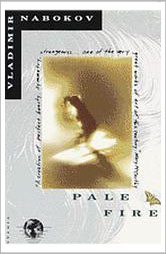Chicago - Oct. 1, 2007
http://www.beachwoodreporter.com/books/connies_corner_nabokovs_pale_f.php
The experience of reading Pale Fire by Vladimir Nabokov is not what you would call a "cozy" read - not comfort food for the mind.
The 1962 novel is, on one hand, a challenge to one's ability to solve puzzles and, on the other hand, one of the first postmodern novels that ask the reader to do all the work himself with the smokiest of hints from the author. It seems to use the elements of an old-fashioned term paper, including a forward, a commentary and an index which encircle a long poem called "Pale Fire." From this, Nabokov creates a novel that doesn't seem to have coherent plot - a story that contains a do-it-yourself kit.
 Here's the deal. In the preface we meet Charles Kinbote, a professor of Russian studies at a small college called Wordsmith in a small town in New York called New Wye. Right away this sounds suspiciously like Nabokov himself who taught a similar discipline at Cornell for many years. Kinbote rented a house on New Wye next door to a famous poet named John Shade who also taught at Wordsmith. Kinbote becomes Shade's friend and becomes the holder of the poet's last work after he is murdered. He thought he had permission from Shade's widow Sybil to edit the work for publication, but she informs him she has entrusted this task to other, more well-known literary critics. Kinbote launches on his own commentary, and voila, we have the book.
Here's the deal. In the preface we meet Charles Kinbote, a professor of Russian studies at a small college called Wordsmith in a small town in New York called New Wye. Right away this sounds suspiciously like Nabokov himself who taught a similar discipline at Cornell for many years. Kinbote rented a house on New Wye next door to a famous poet named John Shade who also taught at Wordsmith. Kinbote becomes Shade's friend and becomes the holder of the poet's last work after he is murdered. He thought he had permission from Shade's widow Sybil to edit the work for publication, but she informs him she has entrusted this task to other, more well-known literary critics. Kinbote launches on his own commentary, and voila, we have the book.
The poem in itself is worth the read. Nabokov was also quite an accomplished poet, so we can credit him with the ability to write pretty good stuff. Pale Fire is an examination of one man's struggle to deal with his own mortality. He tells Shade's story with tenderness: His love of his wife, his grief at the suicide of his only daughter and his quest to find a means of obtaining some kind of immortality. He seems to hope that eternal quality resides in his art and in the never-ending fecundity of nature.
Then comes Kinbote - and a more insufferable person you will never meet. He is obsessed with the country he emigrated from, "Zembla," a veritable twin to Nabokov's native Russia. He describes himself becoming Shade's stalker, always looking for ways to cozy up to him. These attempts are mostly frustrated by Sybil, towards whom he directs the snidest insults he can conjure up.
We also find out, through hideously coy asides by Kinbote, that he is actually the exiled King Charles II of Zembia, surnamed the Beloved. He keeps trying to tell Shade his story and imagines that Shade's poem is actually about his heroic escape from Zembla and his wretched life as an outcast. He also tells us of the assassin, Gradus, who is on his way to the U.S. to kill him.
The rest of the story must be read to be believed, but keep in mind that Nabokov belonged to the Russian nobility and barely escaped the Bolsheviks as a teenager in 1917, spending the next 20 years or so among Russian emigres in Berlin. He led a hand-to-mouth existence there as a translator, journalist, tennis instructor, chess player and even actor. He did not gain much of a living even as a professor at Wellesley and Cornell after he and his wife came to the U.S. The bestselling income from Lolita finally enabled him to quit teaching and become a full-time writer. He wrote Pale Fire from his retirement home in Switzerland.
So what are the ideas in this book? I believe that Shade and Kinbote are both Nabokov himself; there has been much disagreement about this among critics, so take this as only an opinion. Kinbote's commentary is very funny in parts, such as when Nabokov is nailing certain personages in Russian history, for instance, when he calls Charles the Beloved's grandfather Turgid the Third, probably referring to Alexander III. He also skewers the academic world in all its stuffiness and self-absorbency. Kinbote himself is laughable in his inability to see how transparent he is in his self-deceptions. But you can hear the author's voice behind that of the narrator's. So is this just a tirade of a very egotistical Russian intellectual? Not just, but the tirades are not lovable.
What else? The title of the poem is from Shakespeare's Timon of Athens, and the pale fire is that of the moon who steals her light from the sun. Nabokov himself often felt overlooked by the Nobel Prize committee, who honored many of his fellow countrymen. He was stymied in an ongoing attempt to become a full professor of Russian at Harvard. I think Shade is the person Nabokov would like to think he is most of the time, but Kinbote's unlovely characteristics are also his. Nabokov, like Shade, would like a form of immortality: He wants the art he will leave behind at his death to speak for his real self, which he can only hope is that of true nobility.
-

